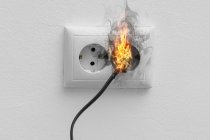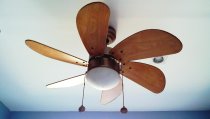Why Do My Light Bulbs Keep Burning Out?

August 19, 2025
Why Do My Light Bulbs Keep Burning Out?
Its expensive replacing a light bulb that keeps burning out and it becomes frustrating when it occurs frequently. High voltage, jarring from unbalanced fan blades, connection issues, or using the wrong type of bulb are just a few culprits. If youve been struggling with premature bulbs death, read on for some causes and ways to address the problem.
High Voltage
The standard power supply voltage in North American homes is 120-volts. If an electrical outlet is supplying more, then a 120 volts rated bulb connected to such outlet will burn brighter and out faster.
Use a multimeter to check the voltage of your home. Reading above 120 volts should give a clue why your bulb burns out quicker. If the voltage is slightly above 120 volts, then consider using 130-volts rated bulbs.
Voltage spikes can also cause the problem. Sometimes you know this when bulbs connected to different fixtures in the house keeps burning out prematurely. To correct this, let a qualified electrician look into the issue.
Vibrations
Filaments in incandescent light bulbs break easily due to movements and excessive vibrations. When a light fixture, for example, is placed beneath a kids or an exercise room, the jiggling from above can cause the filament in the bulb to break. Using LED bulbs can help correct this problem as they have no filament. Plus they are energy efficient.
Vibrations are also common to garage door openers. Openers that arent mounted properly are prone to excessive vibrations, which can crack or break the filament in the light bulb. To fix the issue, upgrade to 130V bulb. These are heavy-duty bulbs with filaments that can better handle vibrations. If the premature bulb death persists, contact your local electrician for professional help.
Loose or Poor Connection
Poor wiring connection between the light fixture and the circuit can cause a voltage drop. Also, a loose bulb-fixture connection can cause the light to flicker on and off. This frequent flickering causes the electrodes in compact fluorescent lamps (CFL), for example, to degrade faster. Also, when a bulb is connected too tightly to the fixture, the lifespan of a light bulb will be much shorter.
To probe for possible connection issues, disconnect power to the unit. Then see if the base of the bulb is in contact with the small metal at the bottom of the socket. When not, readjust so it makes a contact. If you notice the bulb socket has worn out or corroded, then it's time for a replacement. Get in touch, however, with a licensed electrician for assistance if you arent comfortable handling electrical fixtures.
Wrong Type of Light Bulb
Always use bulbs with a wattage rated for the lamps watt. Using a 120-watts bulb, for example, in a lamp fixture rated for 60 watts will cause overheating. This excessive heat, in turn, damages the light bulb. To check for possible damage, unscrew the bulb and check its base for signs of heat damage.
Likewise, when a package of bulbs you purchased starts to burn out within a couple of weeks, chances are the bulbs are bad. Consider a reliable brand.
After trying all the suggestions above but none seem to correct the issue, then its time to call a qualified electrician. The problem could be from your home wiring or even indicate a possible hazard.
For expert assistance delivered by courteous professionals, contact Neighborhood Electric today for any type of lighting installation or repair. Well answer your questions, address your concerns, and take care of your electrical needs.








